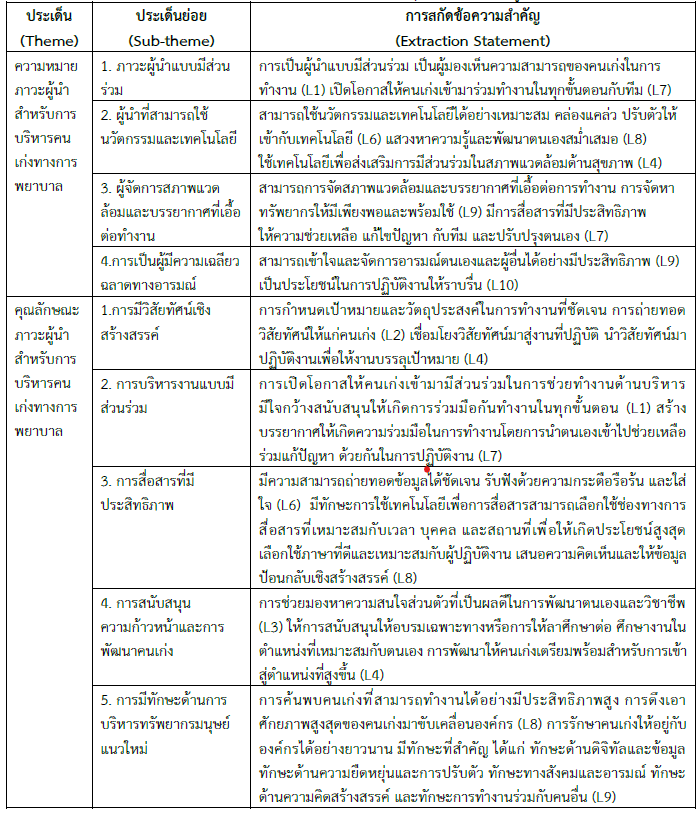ประสบการณ์ภาวะผู้นำสำหรับการบริหารคนเก่งของผู้บริหารระดับต้นทางการพยาบาล ในโรงพยาบาลมหาวิทยาลัย
คำสำคัญ:
ภาวะผู้นำ , การบริหารคนเก่ง, ประสบการณ์, ผู้บริหารระดับต้นทางการพยาบาล , โรงพยาบาลมหาวิทยาลัยบทคัดย่อ
การวิจัยเชิงคุณภาพแบบปรากฎการณ์วิทยานี้ มีวัตถุประสงค์เพื่ออธิบายความหมายและคุณลักษณะภาวะผู้นำสำหรับการบริหารคนเก่งของผู้บริหารระดับต้นทางการพยาบาลในโรงพยาบาลมหาวิทยาลัย คัดเลือกผู้ให้ข้อมูลแบบเฉพาะเจาะจงโดยใช้วิธีลูกโซ่ ผู้ให้ข้อมูล คือผู้บริหารระดับต้นทางการพยาบาลที่มีประสบการณ์ด้านการบริหารการพยาบาล จำนวน 10 คน เก็บรวบรวมข้อมูลด้วยการสัมภาษณ์แบบเจาะลึก และวิเคราะห์ข้อมูลตามแนวทางการวิเคราะห์ข้อมูลของโคไลซี ตรวจสอบคุณภาพข้อมูลใช้วิธีการแบบสามเส้า ผลการวิจัยพบว่า
1. การให้ความหมายภาวะผู้นำสำหรับการบริหารคนเก่งของผู้บริหารระดับต้นทางการพยาบาล สรุปได้ 4 ด้าน ได้แก่ 1) การมีภาวะผู้นำแบบมีส่วนร่วม 2) การเป็นผู้นำที่สามารถใช้นวัตกรรมและเทคโนโลยี 3) การเป็นผู้จัดการสภาพแวดล้อมและบรรยากาศที่เอื้อต่อการทำงาน และ 4) การเป็นผู้มีความเฉลียวฉลาดทางอารมณ์
2. คุณลักษณะภาวะผู้นำสำหรับการบริหารคนเก่งของผู้บริหารระดับต้นทางการพยาบาล สรุปได้ 5 ด้าน ได้แก่ 1) การมีวิสัยทัศน์เชิงสร้างสรรค์ 2) การบริหารงานแบบมีส่วนร่วม 3) การสื่อสารอย่างมีประสิทธิภาพ 4) การสนับสนุนความก้าวหน้าและการพัฒนา และ 5) การมีทักษะด้านการบริหารทรัพยากรมนุษย์แนวใหม่
การวิจัยนี้ชี้ให้เห็นว่า ภาวะผู้นำสำหรับการบริหารคนเก่งของผู้บริหารระดับต้นทางการพยาบาลเป็นเรื่องใหม่จึงจำเป็นต้องมีการขยายความรู้ต่อทั้งในวิธีคุณภาพและปริมาณเพื่อให้เกิดความเข้าใจที่ชัดเจนสำหรับศาสตร์การบริหารทางการพยาบาล สามารถนำไปประยุกต์เป็นแนวทางการพัฒนาเครื่องมือเชิงปริมาณเพื่อใช้วัดภาวะผู้นำสำหรับการบริหารคนเก่งของผู้บริหารระดับต้นทางการพยาบาลในองค์กรต่อไป
เอกสารอ้างอิง
Cabral, A., Oram, C., & Allum, S. (2019). Developing nursing leadership talent-Views from the NHS nursing leadership for south‐east England. Journal of Nursing Management, 27(1), 75-83.
Chan, S. C. (2019). Participative leadership and job satisfaction: The mediating role of work engagement and the moderating role of fun experienced at work. Leadership & Organization Development Journal, 40(3), 319-333.
Collings, D. G., & Mellahi, K. (2009). Strategic talent management: A review and research agenda. Human resource management review, 19(4), 304-313.
DuBrin, A. J. (2016). Leadership. Research Findings, Practice, and Skill. (8th ed.). Boston, MA: Cengage Learning.
Fowler, K. R., Robbins, L. K., & Lucero, A. (2021). Nurse manager communication and outcomes for nursing: An integrative review. Journal of nursing management, 29(6), 1486–1495. doi.org/10.1111/jonm.13324
Goffee, R., & Jones, G. (2007). Leading clever people. Harvard business review, 85(3), 72.
Gubman, L. E. (1998). The Talent Solution: Aligning Strategy and People to Achieve Extraordinary Results. New York : McGraw-Hill.
Hatch, T. (2009). The Outside-Inside Connection:Educational Leadership. New York: McGraw-Hill.
Huang, X., Iun, J., Liu, A., & Gong, Y. (2010). Does participative leadership enhance work performance by inducing empowerment or trust? The differential effects on managerial and non‐managerial subordinates. Journal of Organizational Behavior, 31(1), 122-143.
Ingham-Broomfield, R. (2015). A nurses' guide to qualitative research. Australian Journal of Advanced Nursing, The, 32(3), 34-40.
Jing, Z., Jianshi, G., Jinlian, L., & Yao, T. (2017). A case study of the promoting strategies for innovation contest within a company. Science Research Management. 38, 57–65. doi: 10.19571/j.cnki.1000-2995.2017.11.007
Karwan, D. H., Hariri, H. & Ridwan, R. (2021). Visionary leadership: What, why, and how. doi.10.4108/eai.16-10-2020.2305217.
Kumar, R. D. (2022). Leadership in healthcare. Clinics in Integrated Care, 10, 100080.
Kunie, K., Kawakami, N., Shimazu, A., Yonekura, Y., & Miyamoto, Y. (2017). The relationship between work engagement and psychological distress of hospital nurses and the perceived communication behaviors of their nurse managers: A cross-sectional survey. International Journal of Nursing Studies, 71, 115-124. doi.org/10.1016/j.ijnurstu.2017.03.011
Luedi M. M. (2022). Leadership in 2022: A perspective. Best practice & research. Clinical Anaesthesiology, 36(2), 229–235. doi.org/10.1016/j.bpa.2022.04.002
Mabona, J. F., van Rooyen, D., & Ten Ham-Baloyi, W. (2022). Best practice recommendations for healthy work environments for nurses: An integrative literature review. Health SA Gesondheid, 27, a1788. doi.org/10.4102/hsag.v27i0.1788
Mccauley, C. & Wakefield, M.. (2006). Talent management in the 21st century: Help your company find, develop, and keep its strongest workers. The Journal for Quality and Participation. 29. 4-7.
Mey, M. R., Poisat, P., & Stindt, C. (2021). The influence of leadership behaviours on talent retention: An empirical study. SA Journal of Human Resource Management, 19(0), a1504. doi. org/10.4102/sajhrm. v19i0.1504.
Myers, E., (2024). Participative Leadership Style. Retrieved November 3, 2024 from https://www.simplypsychology.org/participative-leadership.html
Navarro Martínez, O., & Leyva-Moral, J. M., (2024). Digital transformation led by nurses and nursing managers’ priorities: A qualitative study, Journal of Nursing Management, 8873127. doi.org/10.1155/2024/8873127
Nojedeh, S. H., & Ardabili, F. S. (2015). An overview on talent management in nursing. Management
Issues in Healthcare System, 1, 4-17
Northouse, P. G. (2016). Leadership: Theory and Practice (7th ed.). Thousand Oaks: Sage Publications.
Nowak, H. E., & Scanlan, J. M. (2021). Strategy to stay ahead of the curve: A concept analysis of talent management. Nursing forum, 56(3), 717–723. doi.org/10.1111/nuf.12571.
Rafiq, M., Zhang, X., Jia-hai, Y. & Naz, S. (2020). Human resource management: Theory to practice: evidence from literature. 2019. International Journal of Management Research and Emerging Sciences. doi.10.56536/ijmres.v9i1.45.
Rothwell, W. J. & Kazanas, H.C. (2004). Strategic Development of Talent. Massachusetts: HRD Press.
Singchungchai, P. (2009). Principles and Application of Qualitative Research in Nursing and Health. 3rded, Songkhla: Chanmaung. (in Thai)

ดาวน์โหลด
เผยแพร่แล้ว
ฉบับ
ประเภทบทความ
สัญญาอนุญาต
ลิขสิทธิ์ (c) 2025 วารสารเครือข่ายวิทยาลัยพยาบาลและการสาธารณสุขภาคใต้

อนุญาตภายใต้เงื่อนไข Creative Commons Attribution-NonCommercial-NoDerivatives 4.0 International License.
1. บทความหรือข้อคิดเห็นใด ๆ ที่ปรากฏในวารสารเครือข่าย วิทยาลัยพยาบาลและการสาธารณสุขภาคใต้ ที่เป็นวรรณกรรมของผู้เขียน บรรณาธิการหรือเครือข่ายวิทยาลัยพยาบาลและวิทยาลัยการสาธารณสุขภาคใต้ ไม่จำเป็นต้องเห็นด้วย
2. บทความที่ได้รับการตีพิมพ์ถือเป็นลิขสิทธิ์ของ วารสารเครือข่ายวิทยาลัยพยาบาลและการสาธารณสุขภาคใต้







